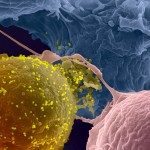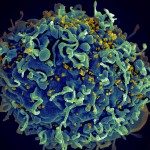A post-doctoral position is available to study SARS-CoV-2 infection in 3D tissue models of the lungs. The successful applicant will join the team of Lisa Chakrabarti at the Pasteur Institute in Paris. The position is fully funded for 3 years in the frame of the 3D-LUNGO PEPR project.
There is a critical need of relevant model systems to understand how viruses spread in the human respiratory tract. We aim to develop human 3D tissue models that mimic the mucosa lining the airways and the pulmonary alveoli. These models will provide the means to identify the determinants of susceptibility to SARS-CoV-2 variants in a physiologically relevant fashion, and thus to better predict the potential for viral spread in the human respiratory tract. Our early findings document a preferential tropism of the Omicron variant for airway rather than alveolar epithelia, which may help explain the higher transmissibility but lower pathogenicity of this variant.
The candidate will use reconstructed human airway epithelia to dissect the different steps of viral spread in the respiratory tract, starting from the crossing of the mucus barrier, the binding to entry receptors, the interactions with resident macrophages, and the mechanisms by which viruses perturb mucociliary clearance; the candidate will then harness the organ-on-chip technology to develop a more advanced model of the airway that integrates both an epithelial compartment and a vascular compartment under continuous fluid perfusion, to evaluate the risks of endothelial damage and analyze the role of infiltrated immune cells on the control of epithelial infection.
The ultimate goal of the project will be to reconstruct the different levels of the respiratory tree, including the nasal mucosa, the bronchial mucosa, and lung alveoli, and to connect the different models via microfluidics in order to study viral spread from one level to the next, and achieve an integrated view of human tissue susceptibility to respiratory viruses. The project will be carried out in close collaboration with the team of Samy Gobaa at the Microfluidics and Biometerials core facility of the Pasteur Institute.
Relevant publications:
– Robinot R., Hubert M., …, Schwartz O.*, and Chakrabarti L.A.* (2021) SARS-CoV-2 infection damages airway motile cilia and impairs mucociliary clearance. Nature Communications 12: 4354.
– Fonseca B.F. and Chakrabarti L.A. (2022) A close shave: How SARS-CoV-2 induces the loss of cilia. Journal of Cell Biology 221: e202206023. https://doi.org/10.1083/jcb.202206023.
– Jeger-Madiot R, Planas D, Staropoli I, …, Gobaa S, and Chakrabarti LA. (2024) Recapitulating memory B cell responses in a Lymphoid Organ-Chip to evaluate mRNA vaccine boosting strategies. bioRxiv 2024.02.02.578553.
Qualifications:
We are looking for a skilled and highly motivated candidate with:
- a PhD in the field of cellular/developmental biology of the lung or in immunology
- research experience in airway/lung tissue biology or antiviral immune responses
- a strong motivation to learn organ-on-chip technologies
- a track record of publications in relevant scientific fields
Expertise in tissue engineering will be an asset. Good communication skills in spoken and written English are essential.
Application:
Interested candidates should submit their application with a detailed CV, a cover letter detailing skills and motivation, and contact information for 2/3 references to Lisa Chakrabarti, chakra@pasteur.fr
Web site: https://research.pasteur.fr/en/team/group-lisa-chakrabarti/


